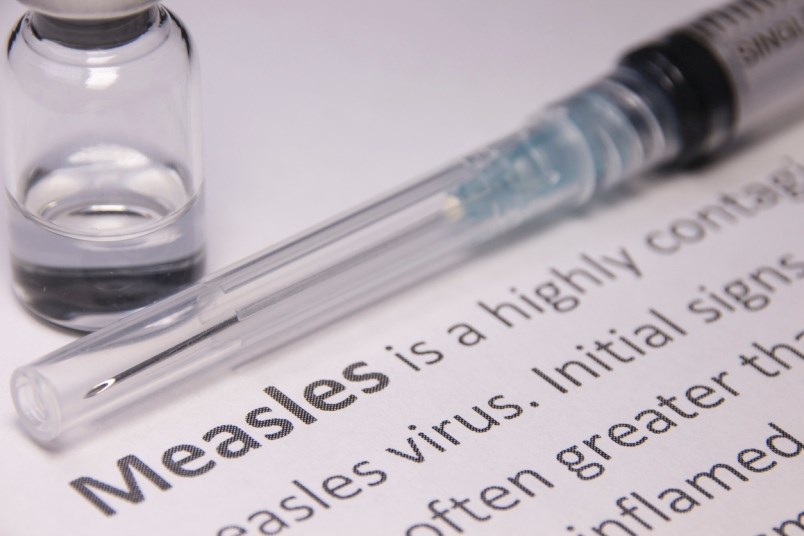While a majority of British Columbians are concerned about a measles outbreak, a relatively large number are also casting doubt on the effectiveness of vaccines in preventing disease, according to the latest poll from Insights West.
“We’ve finally surveyed British Columbians and their views on vaccinations, and there’s a significant level of doubt and belief in conspiracy theories that fly in the face of scientific evidence about vaccinations,” Steve Mossop, president of Insights West, said in a press release. “The recent measles outbreak is evidence of this concerning societal trend, and the need for more education around this significant issue.”
There were 15 reported cases of the measles in Vancouver in February — 11 linked to an outbreak at three Francophone schools, three were individuals who picked up the virus while travelling overseas and in one case public health officials were not able to determine where the infection was picked up.
The survey, conducted between March 8 and 11, found that almost 80 per cent of B.C. residents are concerned about the recent outbreak. Of the more than 800 respondents, 44 per cent said they are “very concerned” while 35 per cent are “somewhat concerned.”
A small percentage of respondents said they have been avoiding certain public locations in light of the recent cases of the measles in the region — seven per cent are avoiding pools, six per cent are staying away from the mall and another six per cent are avoiding family or friends who are not vaccinated.
And while the majority of B.C. residents, 77 per cent, say they support vaccinations and have immunized themselves and their families, another 23 per cent expressed doubt about the effectiveness of vaccines.
The survey found that a small portion of respondents, nine per cent, could be considered true “anti-vaxxers” — three per cent said they have significant doubts or issues with vaccines and choose not to vaccinate themselves or their children, and six per cent stated that they have doubts or issues and are selective about choosing to vaccinate or not. Just over one-in-10 (14 per cent) believe in vaccines overall and have immunized themselves and their families to be on the safe side, but still have doubts about vaccinations.
The survey found there are some significant doubts about how well vaccinations protect people from disease overall. Only 42 per cent of respondents said they are very confident about being protected and 43 per cent said they are somewhat confident, while six per cent are not very confident, one per cent is not at all confident and seven per cent are not sure.
In February, Health Minister Adrian Dix announced the province will start requiring parents to provide proof of immunization when enrolling their children in school. That is expected to be in place for the start of the school year in September.
And it appears the majority of B.C. residents agree. The survey found that 90 per cent of respondents believe that parents should have to show documented proof of their children’s vaccinations when enrolling them in public school. Seventy-five per cent think that public schools should be allowed to require children to be immunized before starting school.
Last week, the province announced the launch of a measles immunization catch-up program with the goal of a 95 per cent immunization rate province-wide. The program is scheduled to run from April until June and will be made available in schools for students, public health units, community health centres and mobile community clinics in select regions.
@JessicaEKerr



